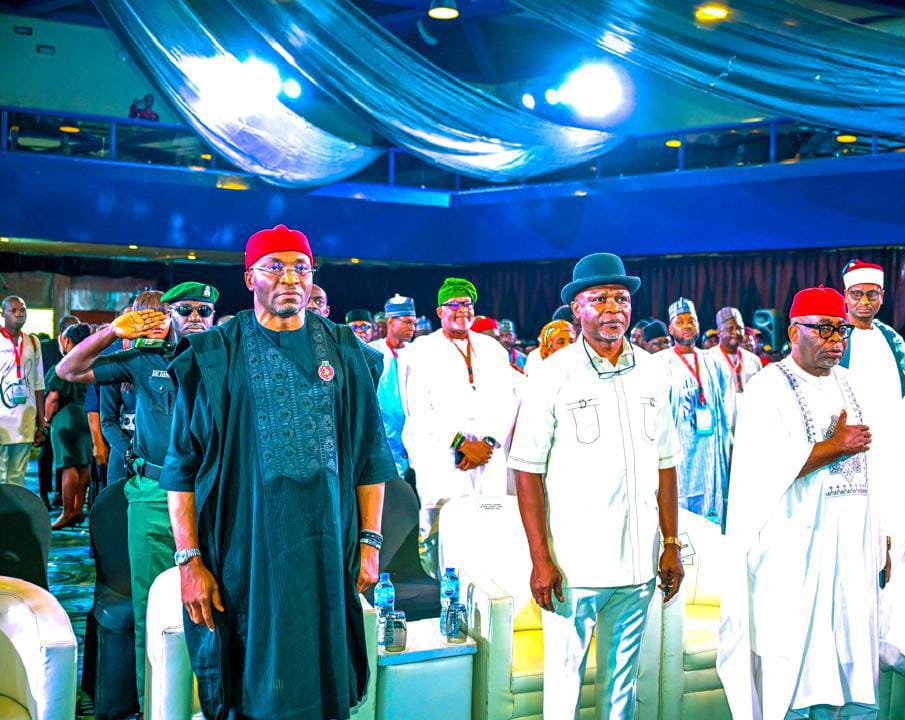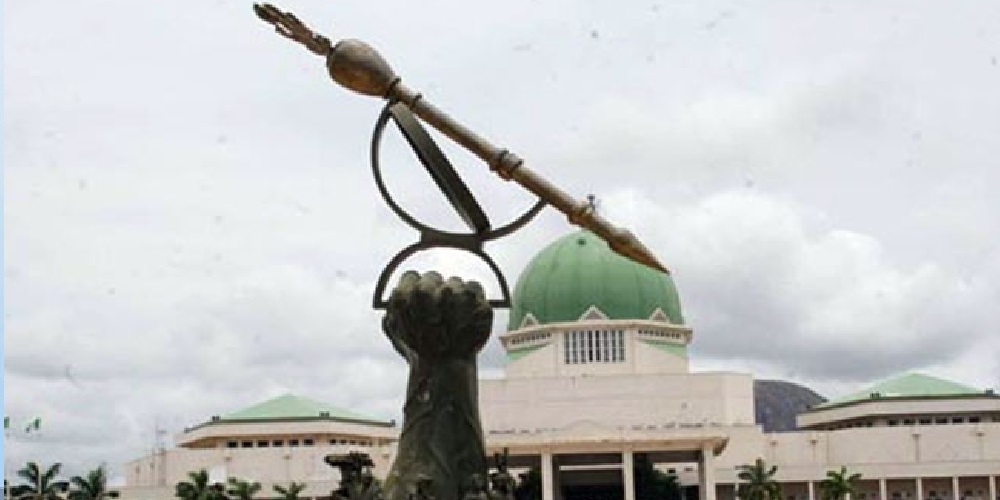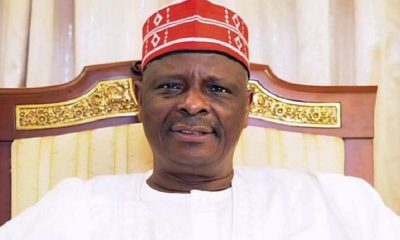News
Governors Forum, State Assemblies Support LG Financial, Administrative Autonomy

News
New NUJ FCT Officers Urged to Uphold Welfare, Integrity and Transparency

By Gloria Ikibah
Chairman of the Nigeria Union of Journalists (NUJ) in the Federal Capital Territory (FCT), Comrade Grace Ike, has charged newly elected executive members to prioritise journalists’ welfare and uphold values of accountability, integrity, and professionalism.
Speaking after the swearing-in of the new officers on Saturday, Comrade Ike reminded them that service in the union demands unity, transparency, and a firm commitment to ethical journalism.
“This union stands on the pillars of welfare, integrity and professionalism. You have been chosen to serve, not to be served,” she said.
The by-election, held to fill three vacant positions unoccupied since the last NUJ-FCT elections on December 4, 2024, saw 54 accredited members cast their votes in a peaceful atmosphere.
Comrade Sharon Emephia of the Correspondents Chapel emerged as Assistant Secretary with 52 votes, while Comrade Daniel Henry Abimiku from the Information Chapel secured the Financial Secretary position with 52 votes as well, and Comrade Ukoko-Tega of Aso Radio/TV Chapel was elected Internal Auditor, also polling 52 votes. A few ballots were declared invalid in each category.
Chairperson of the election committee and Chairman of the National Association of Women Journalists (NAWOJ), Comrade Bassey Ita Ikpang, announced the results alongside committee members Comrade Tony Akowe and Comrade Nkechi Onyeneke. The winners were administered the oath of office by Barrister Ehidiamen Isibor and issued certificates of return.
Comrade Ike commended the electoral committee for conducting a transparent process and thanked union members for their active participation. She officially dissolved the committee following the successful completion of its assignment.
The current leadership of the NUJ-FCT also includes Vice Chairman Comrade Ndambabo Yahaya, Secretary Comrade Jide Oyekunle, Treasurer Mrs. Sandra Udeike, and Ex-Officio member Comrade Ebriku John Friday.
News
Trouble brewing as Trump’s supporters move against Pope Leo, give reason

Catholicism has rarely been more prominent in US politics as the Trump administration openly embraces advisers and officials who proudly say faith has shaped their politics.
But any jubilation on the American Make America Great Again right about the new Pope this week quickly dissipated as key voices from Donald Trump’s Maga movement came to a disappointed conclusion: the first American Pope does not appear to be “America first”.
Little is known about the political leanings of Pope Leo XIV, born Robert Francis Prevost in Chicago.
He has voiced concerns for the poor and immigrants, chosen a name that may reference more liberal church leadership, and he appears to have both supported the liberal-leaning Pope Francis and criticised the US president’s policies on social media.
But the president so far has said only that Leo’s election was a “great honour” for the US. Still, some of Trump’s most prominent supporters were quick to attack Pope Leo, lambasting him as a possible challenge to Trump and on the perception that he will follow Pope Francis in areas like immigration.
“I mean it’s kind of jaw-dropping,” Trump’s former chief strategist Steve Bannon told the BBC on Friday, speaking of Leo’s election.
“It is shocking to me that a guy could be selected to be the Pope that had had the Twitter feed and the statements he’s had against American senior politicians,” said Bannon, a hard-right Trump loyalist, practising Catholic and former altar boy.
And he predicted that there’s “definitely going to be friction” between Leo and Trump.
The Pope’s brother, John Prevost, told The New York Times that he thinks his brother would voice his disagreements with the president.
“I know he’s not happy with what’s going on with immigration,” he said. “I know that for a fact. How far he’ll go with it is only one’s guess, but he won’t just sit back. I don’t think he’ll be the silent one.”
Recent survey data shows that about 20% of Americans identify as Catholic, according to the non-partisan Pew Research Center.
About 53% identify with or lean towards the Republican Party, though there’s plenty of nuance, too: America’s two Catholic presidents, John F Kennedy and Joe Biden, were both Democrats. And nearly two-thirds of US Catholics believe abortion should be legal in all or most circumstances – a departure from the Church’s current stance.
US Catholics also broadly supported Pope Francis: 78% of those surveyed in February viewed him favorably, including a majority of Catholic Republicans.
A number of Catholics In the new Pope’s home city of Chicago, on Thursday, aired disappointment with President Trump and said they hoped Pope Leo XIV would follow the path of his predecessor.
“We hope he’ll continue with Francis’s agenda going forward,” said Rick Stevens, a Catholic deacon from New Jersey who happened to be visiting Chicago when he heard the news.
The US Conference of Catholic Bishops, which leads and coordinates US Catholic activities, celebrated Pope Leo’s election and the message it sends.
“Certainly, we rejoice that a son of this nation has been chosen by the cardinals, but we recognise that he now belongs to all Catholics and to all people of good will,” the conference said in a statement. “His words advocating peace, unity, and missionary activity already indicate a path forward.”
Though Maga supporters represent a small subset of US Catholics, it’s one with outsized access to conservative media and Trump’s ear.
On Bannon’s War Room podcast – known for its hard-right, pro-Trump bent – one guest after another heaped criticism on the new Pope.
“This guy has been massively embraced by the liberals and the progressives,” said Ben Harnwell, a journalist who led Bannon’s efforts to establish what he calls a “gladiator school” for the “Judeo-Christian West” outside of Rome.
“He is one of their own… he has [Pope] Francis’s DNA in him,” Harnwell said.
Jack Posobiec, another Maga commentator dialing in from Rome, was blunt: “This choice of the American cardinal was done as a response, as a message to President Trump.”
The full picture of what led to Pope Leo’s selection on Thursday is still emerging and church decisions don’t map neatly onto US politics. Still, watchers around the world have pored over Pope Leo’s social media profiles in search of clues about his leanings and beliefs.
An X account under his name, with tweets going as far back as 2015, shares links to criticism of Trump’s approach to immigration and hints at other political views, such as stricter gun control.
In February, the account sharply rebuked the US vice-president by posting a link to an opinion piece titled “JD Vance is wrong: Jesus doesn’t ask us to rank our love for others”.
The account also posted a link to a letter from Pope Francis after he clashed with Vance over church doctrine and immigration. Vance – a Catholic convert – had given an interview in defence of the Trump administration’s immigration policies.
Vance has routinely invoked his faith in defense of the administration, particularly immigration policies, which the White House has said put “America first”.
“There is a Christian concept that you love your family and then you love your neighbour, and then you love your community, and then you love your fellow citizens, and then after that, prioritise the rest of the world. A lot of the far left has completely inverted that,” Vance told Fox News.
But US Democrats were not spared either on the account, which has more than a decade of posts. They appear to support Catholic employers who refuse to pay for contraceptives via employee health plans, and following the 2016 US presidential election, one post links to an article accusing Democrat Hillary Clinton of ignoring pro-life Catholic voters.
The BBC asked the Vatican to confirm the account was Leo’s, but did not receive a response.
Vice-President Vance told conservative broadcaster Hugh Hewitt on Friday: “I try not to play the politicisation of the Pope game.
“I’m sure he’s going to say a lot of things that I love. I’m sure he’ll say some things that I disagree with, but I’ll continue to pray for him and the Church despite it all and through it all, and that’ll be the way that I handle it.”
The new Pope’s LGBTQ views are also unclear, but some groups, including the conservative College of Cardinals, believe he may be less supportive than Pope Francis.
Matt Walsh, a commentator with the conservative Daily Wire, wrote: “There are some good signs and bad signs with this new Pope. I want to see what he actually does with his papacy before I pass any kind of judgment.”
But some of the most dedicated Maga supporters already have made up their minds.
Laura Loomer, a far-right influencer who has Trump’s ear, swaying the president on top personnel decisions, called the new Pope “anti-Trump, anti-Maga, pro-open Borders, and a total Marxist like Pope Francis”.
Bannon, who had suggested Leo as a dark horse for the papacy, predicted tensions between the White House and Vatican – and said they could even tear apart American Catholics.
“Remember, President Trump was not shy about taking a shot at Pope Francis,” he said.
“So if this Pope – which he will do – tries to come between President Trump and his implementation of the mass deportation programme, I would stand by.” BBC
News
Digital Shift in National Assembly No Longer Optional – CNA Ogunlana

By Gloria Ikibah
The Clerk to the National Assembly, Kamoru Ogunlana, has stressed the urgent need for the Nigerian Parliament to adopt digital technology, describing it as a necessity in today’s world rather than a choice.
Ogunlana made the remark during his opening address at a three-day retreat organised by the National Assembly in partnership with the Policy and Legal Advocacy Centre (PLAC). The event, which began on Friday, was supported by the UK Foreign, Commonwealth and Development Office (FCDO), and held under the theme “Building an Accountable, Transparent and Resilient Parliament: The Role of the National Assembly Top Management.”
According to him, “the use of technology in the Nigerian Parliament is not an option but a necessity,” especially as legislative processes around the world are becoming increasingly digital.
He pointed out that the retreat’s theme directly addresses the ongoing shifts and demands within the National Assembly, offering a critical moment to rethink approaches, plan strategically, and implement meaningful reforms.
“This presents a vital opportunity to reflect, strategize, and lay actionable plans that will shape the future of the National Assembly Service,” Ogunlana stated.
-

 Education13 hours ago
Education13 hours agoTeenage girl drag JAMB to court over alleged hijab ban during UTME
-

 News11 hours ago
News11 hours agoDefections: It’s a massive betrayal against NNPP -Kwankwaso cries out
-

 News16 hours ago
News16 hours agoTInubu admits taking tough decisions to enable Nigeria grow
-

 News16 hours ago
News16 hours agoCourt orders blood transfusion for two-year-old girl despite her parents’ objections
-

 News16 hours ago
News16 hours agoWhy I Issued ‘Mock’ Apology To Akpabio – Natasha
-

 News7 hours ago
News7 hours agoHow doctor stole one of my twins during birth, Abuja housewife narrates nasty experience
-

 News15 hours ago
News15 hours agoIntroducing Ebule Oritsemeyiwa, a 16-yr-old who scored 334 in 2025 UTME
-

 News4 hours ago
News4 hours agoTrouble brewing as Trump’s supporters move against Pope Leo, give reason

















